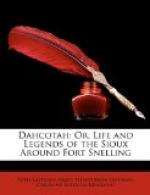The Dahcotahs believe in an evil spirit as well as a good, but they do not consider these spirits as opposed to each other; they do not think that they are tempted to do wrong by this evil spirit; their own hearts are bad. It would be impossible to put any limit to the number of spirits in whom the Dahcotahs believe; every object in nature is full of them. They attribute death as much to the power of these subordinate spirits as to the Great Spirit; but most frequently they suppose death to have been occasioned by a spell having been cast upon them by some enemy.
The sun and moon are worshipped as emblems of their deity.
Sacrifice is a religious ceremony among them; but no missionary has yet been able to find any reference to the one great Atonement made for sin; none of their customs or traditions authorize any such connection. They sacrifice to all the spirits; but they have a stone, painted red, which they call Grandfather, and on or near this, they place their most valuable articles, their buffalo robes, dogs, and even horses; and on one occasion a father killed a child as a kind of sacrifice. They frequently inflict severe bruises or cuts upon their bodies, thinking thus to propitiate their gods.
The belief in an evil spirit is said by some not to be a part of the religion of the Dahcotahs. They perhaps obtained this idea from the whites. They have a far greater fear of the spirits of the dead, especially those whom they have offended, than of Wahkon-tun-kah, the Great Spirit.
* * * * *
One of the punishments they most dread is that of the body of an animal entering theirs to make them sick. Some of the medicine men, the priests, and the doctors of the Dahcotahs, seem to have an idea of the immortality of the soul but intercourse with the whites may have originated this. They know nothing of the resurrection.
They have no custom among them that indicates the belief that man’s heart should be holy. The faith in spirits, dreams, and charms, the fear that some enemy, earthly or spiritual, may be secretly working their destruction by a spell, is as much a part of their creed, as the existence of the Great Spirit.
A good dream will raise their hopes of success in whatever they may be undertaking to the highest pitch; a bad one will make them despair of accomplishing it. Their religion is a superstition, including as few elements of truth and reason as perhaps any other of which the particulars are known. They worship they “know not what,” and this from the lowest motives.
When they go out to hunt, or on a war party, they pray to the Great Spirit—“Father, help us to kill the buffalo.” “Let us soon see deer”—or, “Great Spirit help us to kill our enemies.”
They have no hymns of praise to their Deity; they fast occasionally at the time of their dances. When they dance in honor of the sun, they refrain from eating for two days.




